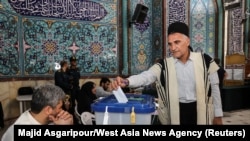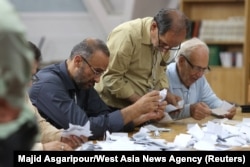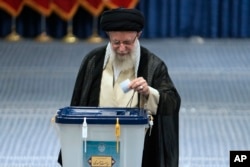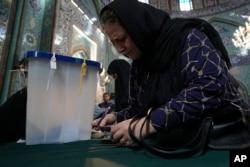Iran is set to hold a second round of presidential elections on July 5 to replace the late President Ebrahim Raisi, who died in a helicopter crash on May 19. None of the four candidates secured enough votes to win the first run on June 28. The top two candidates — reformist Masoud Pezeshkian and conservative Saeed Jalili — will face off again on Friday.
The 40% voter turnout on June 28 was a new all-time low for Iran, VOA’s Persian service reported, citing contested data.
The United States “has no expectation of free and fair elections or fundamental change in Iran’s direction,” Abram Paley, deputy special envoy for Iran, said on June 26.
Iran’s Foreign Ministry challenged that, with its spokesperson Nasser Kanaani claiming:
“The genuine and direct role of the people in determining their political destiny in the Islamic Republic of Iran is an obvious principle and has always been proven in practice.”
That is misleading.
Every citizen in Iran can register as a presidential candidate but the ruling theocratic regime chooses who can run.
Iran’s 12-member Guardian Council¸ controlled by the supreme leader Ayatollah Ali Khamenei, supervises elections and has the power to approve or disqualify candidates.
The Guardian Council disqualified 74 of 80 people who registered to run for the June 28 poll, approving only the six presidential candidates, reportedly preselected by the Ayatollah.
The Council barred from running former president Mahmoud Ahmadinejad, who increasingly challenged Khamenei during his presidency, the Associated Press reported.
Iran’s president is constitutionally subordinate to the supreme leader, who has representatives in every sector of government, giving him control over the legislature, executive, judiciary, military, and security forces.
The International Crisis Group reported that “even by the Islamic Republic’s exclusionary standards,” this election’s raft of candidates is largely limited to conservatives, “ensuring their dominance in all the main centers of power.”
The Council on Foreign Relations, a Washington, D.C.-based think tank, said previous elections in Iran “have seen record-low turnout,” reflecting what it called “largely stage-managed races.”
The Washington, D.C.-based human rights group Freedom House said that while Iran does hold regular elections, they fall short of democratic standards.
Reporters Without Borders listed Iran among “the world’s most repressive countries in terms of press freedom,” raking it 177 out of 180.
In 2022 and 2023, the government violently cracked down on mass protests following the death in police custody of Mahsa Amini, a 22-year-old Kurdish woman detained by Iran’s morality police for wearing an “improper hijab.”
The United Nations said, “State authorities in Iran were responsible for egregious human rights violations” stemming from protests over Amini’s death.









